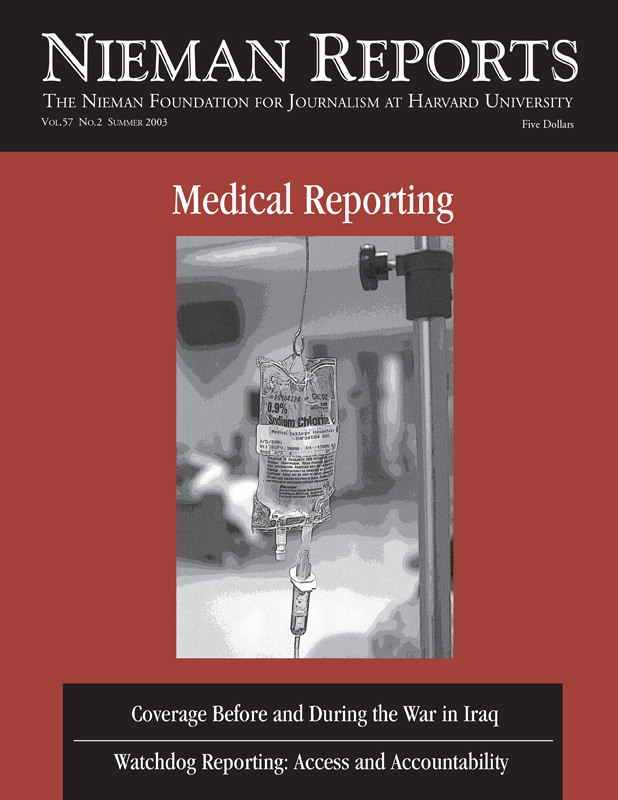“In the 25 years that I’ve been covering world affairs, I’ve never seen such a divide between what American people are reading and watching on TV and what almost everybody else in the rest of the world is reading and watching on TV. It’s like you are talking about two different worlds.”
—Andres Oppenheimer, columnist with The Miami Herald, who is syndicated throughout Latin America, quoted on ABCnews.com on April 1, 2003.
“The difference in coverage between the United States and the rest of the world helped contribute to the situation that we’re in now. Americans have been unable to see how they’re perceived.”
—Kim Spencer, president of WorldLink TV, a U.S. satellite channel devoted to airing foreign news, quoted in a March 25, 2003 Christian Science Monitor story, “World and America Watching Different Wars: CNN vs. Al Jazeera: Seeing is often believing,” by Danna Harman.
“There are really two stories unfolding here, one is the war and its progress and the second one is the progress of world opinion. That second dimension is there in the American press, but it’s clearly way underreported.”
—Tom Patterson, a media expert at Harvard University’s Kennedy School of Government, quoted in a March 25, 2003 Christian Science Monitor story, “World and America Watching Different Wars: CNN vs. Al Jazeera: Seeing is often believing,” by Danna Harman.
“Personally I was shocked while in the United States by how unquestioning the broadcast news media was during this war. If Iraq proved anything, it was that the BBC cannot afford to mix patriotism and journalism. This is happening in the United States and, if it continues, will undermine the credibility of the U.S. electronic news media.”
—Greg Dyke, BBC director general, in a speech at the University of London, reported by Reuters on April 24, 2003 in “BBC Chief Attacks U.S. Media War Coverage,” by Merissa Marr.
“I have a new favorite news anchor: Her name is Michelle Hussein. She is the Washington, D.C.-based anchor of the BBC news on cable TV.… Hussein is evenhanded, and her voice is not filled with that funereal pseudo-emotion that so many of the U.S. anchors have.… The U.S. anchors often make war coverage sound like a natural disaster. … Often you see the exact same footage on the BBC that you see on CNN and elsewhere, but slightly changed. In one case, I noticed almost the exact same war footage, but in the case of the BBC, I saw the dead body of an Iraqi soldier on the ground [on the BBC] that was not shown on CNN. In another case, a civilian dead body by the side of the road, shown on the Beeb, but not on U.S. television.”
—From a message sent to Nieman Reports on March 27, 2003 by NPR correspondent Margot Alder.

“The U.S. press is relying too much on U.S. and British correspondents. I would like to see more reports from Spanish, Italian, French, Arab and other foreign news outlets, especially those that don’t have reporters embedded with the military. When an Arab report is included in American newscasts, it is usually from Iraqi television and is reported in a dismissive fashion. I think the networks could go out of their way to feature more credible journalistic sources from Arab countries in order to give us a different perspective. Al Jazeera is not the only news outlet in the Arab world.”
—From a message sent to Nieman Reports on March 31, 2003 by Nuri Vallbona, photojournalist for The Miami Herald.
Medical Reporting
“The chasm between medical journalists and physicians appears mostly to be one of ignorance rather than conflicting interests or malice,” writes Terry L. Schraeder, who for 10 years worked as a medical journalist before entering medical school. Now doing her residency in internal medicine, she uses these experiences to highlight the problems between journalists and doctors and ways to close the widening gap of distrust. She is convinced that only when they “understand the other’s professional training, education, deadlines, responsibilities, codes of ethics, and internal stresses” will the chasm narrow. – Melissa Ludtke, Editor



